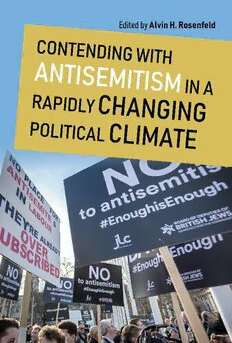
Contending with Antisemitism in a Rapidly Changing Political Climate PDF
Preview Contending with Antisemitism in a Rapidly Changing Political Climate
CONTENDING WITH ANTISEMITISM IN A RAPIDLY CHANGING POLITICAL CLIMATE STUDIES IN ANTISEMITISM Alvin H. Rosenfeld, editor Edited by Alvin H. Rosenfeld CONTENDING WITH ANTISEMITISM IN A RAPIDLY CHANGING POLITICAL CLIMATE INDIANA UNIVERSITY PRESS This book is a publication of Indiana University Press Office of Scholarly Publishing Herman B Wells Library 350 1320 East 10th Street Bloomington, Indiana 47405 USA iupress . org © 2021 by Indiana University Press All rights reserved No part of this book may be reproduced or utilized in any form or by any means, electronic or mechanical, including photocopying and recording, or by any information storage and retrieval system, without permission in writing from the publisher. The paper used in this publication meets the minimum requirements of the American National Standard for Information Sciences— Permanence of Paper for Printed Library Materials, ANSI Z39.48-1992. Manufactured in the United States of America Cataloging information is available from the Library of Congress. ISBN 978-0-253-05811-9 (hardback) ISBN 978-0-253-05812-6 (paperback) ISBN 978-0-253-05814-0 (ebook) First printing 2021 This book is dedicated, with gratitude and appreciation, to Dr. David Pfenninger, who keenly understands the lethal character of antisemitism and the threats it poses, and also to the memory of Louis Mervis and Gerald Paul, cherished friends and longtime supporters of the work of Indiana University’s Borns Jewish Studies Program and the Institute for the Study of Contemporary Antisemitism CONTENTS Foreword / Dina Porat ix Introduction / Alvin H. Rosenfeld 1 I. The IHRA Definition of Antisemitism and Its Ramifications 1. The IHRA Definition and Its Critics / Bernard Harrison and Lesley Klaff 9 2. Applying the IHRA Working Definition to the UN and Human Rights NGOs / Gerald M. Steinberg 44 II. Intellectual and Ideological Currents of Antisemitism 3. Israel as a White Colonial-Settler State in Activist Social Science / Balázs Berkovits 75 4. Traditionalism or the Perennial Philosophy: Religionism, Politics, and the New Right / Mark Weitzman 96 5. Antisemitism on the Left: The Case of Jewish Voice for Peace / Miriam F. Elman 113 III. Antisemitism on College and University Campuses 6. Contending with Antisemitism in Its Many Forms on American Campuses / Kenneth Waltzer 137 7. In the Context of a Coarsened Climate: Campus Antisemitism and the Alt-Right, Alt-Lite, and Far Left / Linda Maizels 158 8. Rethinking Campus Antisemitism in America and How to Address It / Tammi Rossman-Benjamin 185 IV. The Global Reach of Antisemitism 9. Orchestrating Public Blindness in Contemporary France / Daniel Dayan 211 viii | Contents 10. Legislating and Distorting the History of the Holocaust: The Polish Case / Jan Grabowski 231 11. The Changing Faces of European Antisemitism—the Hungarian Case: Attitudes toward Jews in Viktor Orbán’s Semiauthoritarian Regime / János Gadó 249 12. Contradiction as Program: The German AfD between the Rejection of the Memory of the Holocaust and a Self-Proclaimed Political Home for Jews / Marc Grimm 267 13. A “Serious Attack on Jewish Life”: Antisemitic Stereotypes in the Public Debate about Ritual Male Circumcision in Germany in 2012 / Dana Ionescu 287 14. What Role Does Antisemitism Play in Jeremy Corbyn’s Labour Party? / Dave Rich 313 15. Antisemitism and the Left in the UK and the Global Significance of the Return of the “Jewish Question” / Philip Spencer 325 16. Rethinking the Role of Religion in the Arab-Israeli Conflict and Its Reflection on Arab Antisemitic Discourse / Esther Webman 344 17. Can the European Institutions Combat Antisemitism Effectively? / Michael Whine 367 Index 383 FOREWORD Dina Porat In March 2016, the president of Indiana University, Professor Michael McRobbie, received a letter from Juli Edelstein, the Speaker of the Israeli Knesset, or Parliament. It referred to a conference, “Anti-Zionism, Antisemitism, and the Dynamics of Delegitimization,” which was about to take place on Indiana University’s Bloomington campus.1 “As the Speaker of the Israeli Knesset,” Edelstein remarked, “I write to express my deep appreciation of your principled stand on these matters. . . . Your coura- geous position . . . is highly appreciated. . . . I would also like to express my appreciation to Indiana University for nurturing one of the world’s leading research institutes for the study of antisemitism,” referring to the Institute for the Study of Contemporary Antisemitism, founded and led by Professor Alvin H. Rosenfeld. More words of appreciation were included in an additional letter, this one from Professor Judea Pearl, the father of Daniel Pearl. Addressed to the organizers of the conference and to the “distinguished scholars from across the globe” who would be participating in it, the letter acknowledged that “this conference is noble, timely and crucial” and concluded with this wish: “May the spirit of Daniel strengthen yours.”2 Daniel Pearl, a talented young Jewish journalist, was brutally murdered in 2002 in Pakistan. President McRobbie also addressed the participants of the conference, emphasizing that antisemitic incidents of all kinds were on the rise around the world, including hate speech, the spread of neo-Nazi graffiti and other forms of verbal and written threats, the defacement of synagogues and Jew- ish cemeteries, and even acts of murderous terror. During the previous year, for instance, Jews were killed in Paris and Copenhagen. Referring pointedly to aggressive rhetoric spreading on American campuses, President McRob- bie warned that “dangerous rhetoric often is the precursor of tragedy and must be unconditionally condemned before it can take root and spread.”3 Among North American universities, in some of which anti-Zionism and antisemitic utterances and behavior have become a notable and dis- turbing presence, the Institute for the Study of Contemporary Antisemitism at Indiana University and the overall tolerant atmosphere of this university are a welcome oasis. The institute is the only one of its kind in the United ix
